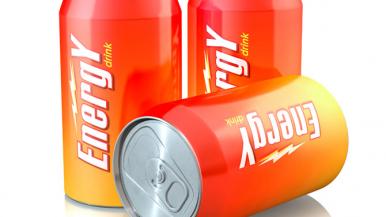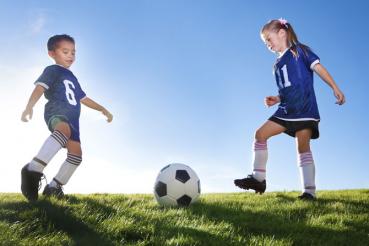Back in the days before MP3 players and social media, college students typically chugged either coffee or neon-colored soda (sometimes both) to combat fatigue brought on by all-nighters. These beverages supplied — and still do — energy-lifting caffeine, appealing not only to co-eds but to everyone from overworked executives to overwrought parents.
But in the mid to late 1990s, a crop of new energy drinks began to hit the market, targeting adolescents and teenagers with promises of even bigger, and sometimes even longer, energy boosts.
These drinks and their potential dangers have recently drawn attention from the medical community and media, with many health experts attributing increases in emergency room visits to downing the beverages, alone or in combination with prescription drugs or alcohol. Some even blame several teenage deaths on energy drinks.
But are these drinks really as bad as all that, or are they worth the risk?
Unregulated caffeine
"The concern is that these drinks — which are not regulated by the same FDA guidelines as sodas — may contain unhealthy levels of caffeine and sugary substances, not to mention additives that aren’t well researched or understood," says clinical dietitian Jennifer Ventrelle, MS, RDN, CPT.
Adding to that concern, the FDA doesn't regulate how much caffeine goes into these drinks. And, according to research conducted by Consumer Report, product labels don't always accurately reflect caffeine levels, with some energy drinks containing higher stimulant levels than indicated on the label. Some beverages include guarana, a plant that contains caffeine, which may not even be factored in as part of the caffeine total.
An abundance of caffeine is definitely not considered a health bonus by dietitians like Ventrelle. "Caffeine exaggerates the effect of natural hormones like adrenaline. It gets your heart pumping faster, it causes you to breathe faster and gives you that stimulated feeling, all of which usually lasts no more than two hours,” says Ventrelle.
"Caffeine can be problematic because it leads to restlessness, nervousness and sleeplessness. Excessive caffeine can cause high blood pressure, irregular heartbeats and even seizures."
Determining what's acceptable
How much caffeine, if any, is considered safe? "Adults should keep caffeine consumption to less than 400 milligrams a day, or about three cups of 8-ounce coffee, according to the FDA," Ventrelle says.
"But less is known about what's acceptable for kids — and they're the ones we really worry about when it comes to these drinks because there are so many unknowns, and their bodies are less developed and more vulnerable. For them, some might say limit it to 85 milligrams, or around a can and a half of caffeinated soda, or even less," Ventrelle says.
So with some energy drinks containing more than 200 milligrams of caffeine per serving, a child could exceed his or her daily "allowance" of caffeine with just one drink.
Knock back two or three energy drinks a day and you could be consuming four to six times more sugar than the recommended daily amount.
And there's more …
An abundance of caffeine isn't the only troubling component of energy drinks.
Knock back two or three energy drinks a day and you could be consuming four to six times more sugar than the recommended daily amount. And recent research suggests that a compound called carnitine, which is used as a supplement in some energy drinks and is also found in red meat, may lead to hardening and clogging of the arteries.
Combining energy drinks with prescription drugs and alcohol is also problematic because it can cause heart irregularities and anxiety.
A recent survey performed by the U.S. government found that the number of people seeking emergency care after drinking energy beverages doubled in a recent four-year period, the same period in which energy drinks saw a significant increase in popularity. Adolescents and teens are particularly susceptible to combining the two in search of a "better buzz."
Healthful alternatives
Fortunately, energy drinks aren't the only ways to add oomph to your day, or to your child's. While health experts, government officials and energy drink manufacturers debate issues surrounding energy drinks (e.g., ingredient restrictions, labeling), why not try some strategies that have been proven to be healthy and effective in boosting energy?
1. Eat breakfast, which has been shown to improve alertness and concentration. Skip the surgery cereals that may give you a temporary lift, and go for menu items that will sustain you, such as Greek yogurt with berries and whole-grain cereal; whole grain toast with peanut butter and milk; or oatmeal mixed with raisins and almonds.
2. Drink water. Lack of energy (and hunger) is often a result of dehydration. And FYI, while vitamin water can help keep you hydrated, don't depend on it for your nutritional needs. It's better to get your vitamins from actual food or supplements, says Ventrelle, because vitamin water drinks are often sugary and not as healthful as they appear.
3. Avoid drinking too much alcohol (no more than one to two drinks a day), which is a depressant and can sap your energy.
4. Establish a healthy sleep routine, by going to bed and getting up at the same time every day.
5. Exercise regularly, and your energy level will certainly see a bump. Feel that midday slump or midnight droop? Take a brisk walk around the block or jog in place for a few minutes to give yourself a quick lift.
These tactics may not come neatly packaged in a colorful container with a catchy name, but they can make a difference in terms of your energy level and your overall health. Better yet, they're caffeine-free.




